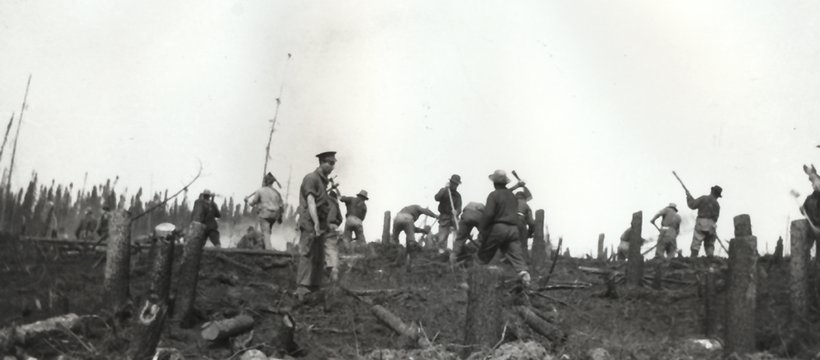Impact
Our ReachSuccess Stories
iheartculture.ca
What is Culture?
Cultural Benefits
E-Update
News
Careers in Culture
Important and Commemorative Days

And We are Witness: Canada’s Internment Operations
November, 2014
How Ukrainian and Japanese Canadians became prisoners of war in their own country during the World Wars’.
It’s a story that few people know. If you’ve heard it, it might have the air of rumour. Eight thousand people falsely imprisoned and treated as prisoners of war in Canada: 5,000 Ukrainians, but also Serbians, Croatians, Armenians, Hungarians and Germans. Here’s how it came to pass. At the outbreak of the First World War in August 1914, the Government of Canada enacted the War measures Act. The Act made it possible to pass legislation allowing authorities to arrest and imprison any person without charging that person with a crime or providing access to the courts. One of the government’s first actions under the Act required immigrants from enemy countries - Germany, Austria- Hungary, the Ottoman Empire and Bulgaria - to register with the North West Mounted Police or the militia. About 80,000 people registered and then regularly presented their registration cards, each time paying $2 (about a day’s wages at the time) to cover the cost of the process.
Recognition of Internment Camp in Province
In its past, Saskatchewan had one, short-lived, internment camp: the Eaton Camp, located at the junction of Highway 60 and the Canadian National Railway, four kilometers southwest of Saskatoon. The detainees arrived on February 25, 1919, travelling from the camp at Munson, Alberta where they had worked on the railway. The war had already ended on November 11, 1918. On March 21, 1919, they were moved to a military installation at Amherst, Nova Scotia and then deported.
On October 28, 2014, to mark the 100 years since “enemy aliens” were required to register, the Ukrainian Canadian Congress (UCC-SPC) placed a plaque at the site of the Eaton Camp. The plaque portrays internees behind barbed wire at Castle Mountain Internment Camp in Banff.
Bohdan Kordan, director, Prairie Centre for the Study of Ukrainian Heritage, says this is an opportunity to re-dedicate ourselves to remembering what happened. “This is an unknown page in Canada’s history, and a country without its history is not a country. Knowing our history we can see where we’ve gone wrong. It tells us what we expect and want from ourselves. We note political errors in judgement. These challenges keep reappearing. How do we rise to these challenges? By looking back and taking stock.”
Japanese Canadian Internment 1942-1949
This fall, the Regina Japanese Canadian Club and the RCMP Heritage Centre brought to Regina, the exhibit, A Call for Justice - Fighting for Japanese Canadian redress (1977-1988).
In 1942, after Japan’s attack on Pearl Harbor, the Government of Canada considered people of Japanese descent to be a threat. Under the War measures Act, over 22,000 Japanese Canadians were banned from the BC Coast, sent to internment camps in central BC, Alberta or Manitoba, lost all their property and belongings, and were later dispersed across Canada.
The National Association of Japanese Canadians, led by Art Miki, worked with community members, media, multicultural and human rights coalitions, two governments and five ministers of multiculturalism before achieving redress. On September 22, 1988, Prime Minister Brian Mulroney acknowledged in the Parliament of Canada the past injustices towards Japanese Canadians from 1942-1949.
Al Nicholson, CEO, RCMP Heritage Centre, explains that the Centre has the responsibility to tell the story of the police and the growth of Canada as a nation. “This is a sad story, but it is part of our history. Wars have all kinds of effects. Even on those with no direct involvement. This story speaks well of those who came after and worked for redress.”
To Andre Boutin-Maloney, president, Regina Japanese Canadian Club, remembering the internment camps honours those that came before. “We need to recognize when we’ve made mistakes and find ways to address those mistakes. This is part of what it means to be Canadian. We try to do better, or we try to make atonement. People were imprisoned for a racially charged reason. Internment took a huge toll on Japanese Canadian culture.”
Both the UCC-SPC and the RCMP heritage centre receive funding from SaskCulture thanks to the Saskatchewan Lotteries trust Fund for Sport, Culture and Recreation.
Details in this article was gathered with help from the UCC-SPA, RCMP Heritage Centre, Ukrainian Canadian Congress and Citizenship and Immigration Canada websites, the Manitoba history Journal and the Nikkei Museum.

 Engage - Volume 5, Issue 1, Fall 2014
Engage - Volume 5, Issue 1, Fall 2014